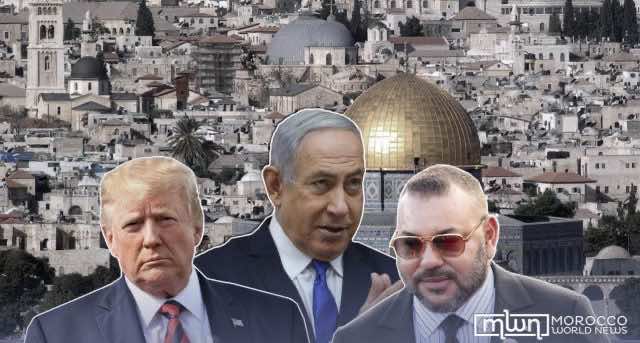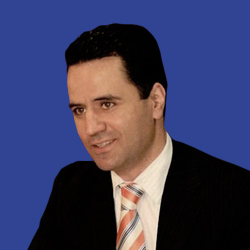 moroccoworldnews.com
moroccoworldnews.com
Morocco may be seeking to avoid a confrontation with President Trump or incurring his wrath in a way that could harm the kingdom, especially on the Western Sahara issue.
Washington, D.C. – Four days have passed since the American news website Axios published a report claiming that Israel is trying to pressure the Trump administration into recognizing Western Sahara as part of Morocco in exchange for the normalization of relations between Rabat and Tel Aviv. The Moroccan Ministry of Foreign Affairs, meanwhile, has not yet denied the rumors.
The Moroccan government’s silence could lead observers to believe there is a behind-the-scenes agreement between Morocco and Israel. The fact that Morocco’s foreign minister, Nasser Bourita, said Moroccans should not be more Palestinian than Palestinians themselves reinforces the impression.
Morocco’s statement following Trump’s “Deal of the Century” announcement only serves to add to the impression, since it did not mention the principles Morocco has always cited when defending the rights of Palestinians.
While the Ministry of Foreign Affairs’ statement expressed support for the rights of the Palestinian people to establish their independent state, it did not argue for the withdrawal of Israel from the territories it has occupied since June 1967. Nor did it include the explicit language Morocco usually employs when defending the legitimate rights of the Palestinian people.
What is remarkable about the Moroccan statement is the assertion that the “Deal of the Century” includes some principles in line with the Moroccan position, especially the two-state solution.
However, a careful reading of President Trump’s plan shows that the deal does not, in fact, respect any Security Council resolutions on the conflict and even violates the principle of a two-state solution by recognizing Israel’s annexation of the lands occupied in 1967.
The plan also recognizes Jerusalem as the undivided capital of Israel, depriving Palestinians of sovereignty over any part of the holy city. The project only gives Palestinians authority over lands adjacent to the city , saying they can call them “Al-Quds,” the Arabic name for Jerusalem, or any name they would like.
The unclear language of the Moroccan statement leaves Morocco’s position open to interpretation. One possible reading of the comments is that Morocco intends to support Trump’s plan as a basis for an eventual solution.
In light of the silence of both the Moroccan and American governments on Axios’ allegations, it remains unclear whether the vague rhetoric it is a tactic to buy time without angering President Trump or, is indeed, signals readiness to accept normalization with Israel in exchange for US support on the Western Sahara issue.
If Morocco were to make a deal with the Trump administration and Israel, it would give the Polisario Front and Algeria a golden opportunity to draw false a parallel between the Western Sahara issue and the Palestinian cause
In the past, Morocco’s opponents have tried to apply the Palestinian issue narrative to Western Sahara, using words such as “occupied land” and calling Morocco an “occupying power” in the Western Sahara. However, the efforts failed due to the historical, demographic, ethnic, and legal differences between the two conflicts.
If Morocco were to barter Palestine in exchange for gaining ground on the Western Sahara file, it would put itself in the same category as Israel, becoming subject to campaigns from international civil society organizations. The campaigns would have dire effects on Morocco’s international reputation and lead many countries to support the Polisario Front.
The international community’s view of the Western Sahara conflict as a low intensity conflict, along its low profile presence in international media, have helped Morocco over the past four decades to maintain the status quo and forge important diplomatic inroads.
However, if Morocco makes any uncalculated moves, the situation could change and the kingdom could find itself under unprecedented media, political, and diplomatic pressure.
Normalization contradicts Morocco’s position on Palestine
If Morocco makes a deal with Israel, it could also create a frenzy on the Moroccan streets. The vast majority of Moroccans reject normalization with Israel without a solution guaranteeing the rights of the Palestinian people.
While the Western Sahara is the primary political issue in Morocco, the Palestinian issue also holds significant value in the shared conscience of the Moroccan people, for its historial and religious connotations.
In addition, the Moroccan government has been steadfast on the issue and remained at the forefront of countries defending the rights of the Palestinian people in building their independent state with Jerusalem as its capital. King Mohammed VI and the Moroccan government have expressed this position on many occasions.
For example, Morocco was one of the first countries to express unequivocal rejection of President Trump’s decision to move the American embassy from Tel Aviv to Jerusalem.
In his message to Trump in December 2017, King Mohammed VI stressed that the legal status of Jerusalem is at the heart of the Israeli-Palestinian conflict. The King expressed the same position in a letter to the Secretary-General of the UN.
In November 2019, King Mohammed VI reiterated his stance in a message to the chairman of the UN Committee on the Exercise of the Inalienable Rights of the Palestinian People. In December 2019, he also sent a note of the same nature to the conference for the 50th anniversary of the Organization of Islamic Cooperation in Rabat.
In all the letters, the King affirmed Morocco’s steadfast position, calling for Jerusalem to be the capital of the Palestinian state and for the implementation of the Security Council resolutions, including Israel’s withdrawal from all the territories occupied since 1967.
In the wake of Axios’s report, some observers have saidMorocco should not be ashamed to normalize relations with Israel as long as it achieves diplomatic gains on the Western Sahara issue.
The US alone cannot solve the Western Sahara dispute
The argument for a US-Morocco-Israel deal ignores the dynamics of the conflict at the Security Council and how the UN works.
Even if the US were to support Morocco, it would be impossible to impose its position on the other members of the council, or change the course of the political process launched in 2007. Whether the US chose to support Morocco or the Polisario, it would face fierce resistance from other UN members.
There is no doubt that a US’ recognition of Moroccan sovereignty over Western Sahara would be a significant diplomatic coup for Morocco, and a strong blow to its opponents in the short term. It would also serve as a boost for Moroccan diplomacy. However, the scenario would not serve Morocco’s image internationally, in either the medium or the long term.
Moreover, the step would not lead to any solution to the Western Sahara issue. Even if President Trump did decide to recognize Morocco’s sovereignty over Western Sahara, the move would not have any legal repercussions unless the US were to pressure other members of the Security Council to recognize that the only way to solve the conflict is direct negotiation between Morocco and Algeria, a major party in the dispute.
However, achieving this is very unlikely due to the different political agendas of Security Council permanent members. Even if we assume that France would side with the US, it is highly unlikely Russia would give up its traditional ally, Algeria. China and the UK are also unlikely to support the American move.
The recent history of the Western Sahara conflict is perhaps strong evidence that such an approach would not work for Morocco. If there was real American intention to recognize the Moroccaness of the Western Sahara—which I rule out—it would not be the first time that an American administration has tried to use its international influence to support the Moroccan position.
After Morocco submitted its Autonomy Plan to the Security Council in April 2007, the Bush administration tried to persuade other members of the council to support Morocco.
During consultations before the adoption of resolutions 1754 and 1783, in April and October 2007, respectively, then US Secretary of State Condoleezza Rice tried to pressure Polisario and the Security Council into adopting a draft resolution making the Moroccan proposal the only basis for a political solution. However, her attempt failed due to opposition from Russia, Spain, and the UK.
Rice tried again in April 2008, when she worked on adopting a three-step plan to support the Moroccan position.
First, she called on the Secretary-General to indicate in his annual report that the Moroccan proposal is the only basis for a final political solution to the Sahara issue. Second, Rice invited member states of the council to issue statements supporting the Moroccan plan. Finally, she planned to invite delegations from Morocco and the Polisario to visit Washington and start negotiations.
However, the American diplomat’s attempt was unsuccessful due to opposition in the Security Council and the exclusion of the American proposal from the Secretary-General’s annual report.
Even France, a country Morocco expected to support the American approach, did not make any explicit statements to support the Moroccan proposal as the only basis for ending the political process.
Based on the history and differing agendas of the Security Council’s permanent members, it is unlikely the council would support Washington if it recognized Morocco’s sovereignty over Western Sahara. Consequently, the conflict would be in the same deadlock.
On the other hand, due to unprecedented political division in the US because of Trump’s way of handling power, his unilateral decision-making, and his keenness to challenge many Obama-administration policies, there is a very high possibility that American recognition of Morocco’s sovereignty over Western Sahara would no longer hold when a Democrat president comes to power, either in 2020 or 2024.
Fierce opposition and condemnation from the Democratic Party on many of Trump’s foreign policy decisions, including those related to the Israeli-Palestinian conflict, indicate that one of the first decisions a Democrat president would adopt would be to restore pragmatism, and the balance of the US foreign policy. In this scenario, it is highly likely that the Western Sahara issue would be reviewed, and such a move would not be to Morocco’s advantage.
Israel’s influence on Trump is overrated
Those who would accept normalization with Israel, as long as it can influence President Trump in favor of Morocco, have an exaggerated impression of how much influence Israeli Prime Minister Benjamin Netanyahu has within the Trump administration.
Perhaps the reason for this misunderstanding is the decisions serving Israel’s interests that President Trump has made since coming to power. However, the main motive behind the decisions was Trump’s agenda, not Netanyahu’s.
President Trump is aware that defending Israel is a central value of evangelical voters, representing 70 million people in the US and a strong electoral base for Trump. Supporting Israel is also a priority for American billionaire Sheldon Adelson, the top donor in President Trump’s 2016 election campaign.
Consequently, to maintain the support of this influential group in American politics, Trump must make decisions in line with their ideological and religious orientations.
Contrary to Israel’s security interests, Trump did not hesitate to withdraw American forces from northeastern Syria, leaving Israel in direct confrontation with Iran and Hezbollah.
Trump also did not respond to the attack on Saudi oil facilities by Iran in September 2019. He even refused Netanyahu’s request to lift US’s freeze of financial support to Palestinian security forces.
According to a December 2019 article in the Foreign Policy magazine by Andrew Miller, the former director of the Israeli portfolio in the National Security Council under Obama, Trump’s indifference to Israeli national security created a state of anxiety in Israel and an impression that Trump is an unreliable ally in deterring Iran and preserving Israel’s security.
Morocco adopts vague language to avoid a clash with Trump
Based on these objective considerations, it appears that Morocco does not need to make what would be a suspicious deal with the US and Israel. That being said, two scenarios explain why Morocco has been silent in the face of media reports suggesting normalization with Israel.
The first scenario is that Morocco is seriously considering normalization with Israel, contradicting its consistent position on the Palestinian issue. In this case, Morocco’s u-turn would serve the agenda of the Israeli prime minister, who has been seeking diplomatic gains to cover up his corruption scandals.
Whether Morocco has a desire to normalize with Israel or not, the media momentum achieved in the wake of Axios’ report may benefit Netanyahu, who wants to appear as the only Israeli leader able to preserve Israel’s interests and achieve expansion in the Palestinian territories and end Israel’s regional isolation at the same time.
The second scenario, and perhaps the most compatible with reality, is that the kingdom is aware it is not dealing with a conventional American administration who builds its positions on balance, pragmatism, and respect of international law.
Rather Morocco is dealing with an administration led by an impulsive president who does not take into account the interests of America’s allies, but only his own interests and the interests of those close to him.
Given President Trump’s special care for the “Deal of the Century” and his close relationship with fierce Israel-defender Sheldon Adelson, Morocco may have chosen to employ more polysemic language that could lead both sides to believe in Morocco’s support for them.
Through its statement, Morocco may be seeking to avoid confrontation with President Trump or provoking any consequences that could harm the kingdom, especially on the Western Sahara issue.
The Moroccan statement welcomes Trump’s efforts to end the Israeli-Palestinian conflict. The statement also vaguely affirms that Trump’s plan includes some points that intersect with the Moroccan position, especially regarding the two-state solution.
At the same time, the statement emphasized that any agreement should be based on international legitimacy and result in the creation of an independent, viable, and sovereign Palestinian state with East Jerusalem as its capital.
Regardless of whether the current media frenzy is based on facts or only seeks to serve Netanyahu’s agenda, Morocco must demonstrate wisdom and courage in managing its foreign policy.
It is imperative that Morocco avoid entering into underhand deals that could affect its hard-won reputation on the international stage or diminish the efforts it has made over the past four decades to defend its territorial integrity.





